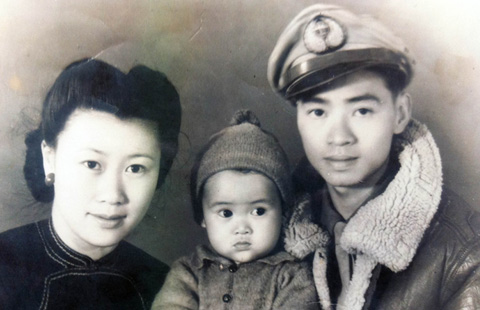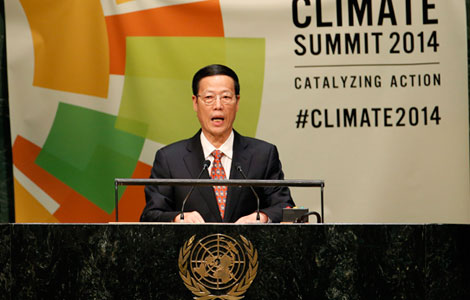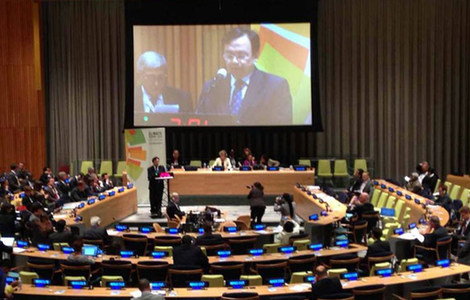US, China relations key to future: Rice
Updated: 2014-09-23 05:39
By Chen Weihua(China Daily USA)
|
||||||||
 |
|
US National Security Advisor Susan Rice talks about relations between United States, China and Southeast Asian nations at a meeting on Monday at the Brookings Institution. Chen Weihua / China Daily |
US National Security Advisor Susan Rice said Southeast Asian nations should not have to choose sides among major powers, particularly the United States and China.
Rice made the remarks on Monday at the Brookings Institution in Washington in a talk focused on Southeast Asia.
Rice said the region is facing serious questions about how to adapt as several major powers become more active there. "China's rise, Japan's re-emergence, India's revival, and, of course, America's rebalance, these dynamics are real, and they converge squarely in Southeast Asia," she said. "But these trends are opportunities for greater cooperation, not just competition."
Rice just returned from a trip to China from Sep 7-9 to prepare for US President Barack Obama's meeting with Chinese President Xi Jinping on Nov 12 following a two-day APEC summit in Beijing.
"To be sure, America's relationship with China is important to the future of both our nations, to the region and to the world," she said.
Rice said Obama will meet Xi again to continue deepening their cooperation on major regional and global challenges, building a relationship that allows the two countries to work together on shared interest and talk frankly about areas where they disagree.
It will be Obama's second trip to China since he visited there in November 2009.
Many China watchers have felt that an overemphasis on differences in the past year has cast a shadow on the bilateral relationship, especially when the shirt-sleeves summit at the Sunnylands estate in California in June last year raised people's expectations for the two countries' ability to expand cooperation and manage differences.
As Rice voiced US continued commitment to its rebalance to Asia strategy, many both in and outside China have regarded the strategy as a scheme to curtail China's rise. Many Chinese also believe the US is trying to take advantage of the maritime territorial disputes China has with several of its neighbors.
Singapore Minister for Foreign Affairs K Shanmugam, while welcoming the US rebalance, pointed out at the Brookings meeting that the US rebalance cannot only be military. "It has to be economic as well," he said.
The heavy emphasis on the military component after the Obama administration rolled out its Asia rebalance strategy four years ago drew criticism both inside and outside the US.
Besides relocating its own militaries to the Asia Pacific, the US was also the largest arms supplier to East Asia with sales of $4.1 billion in 2013, IHS Jane's reports.
Shanmugam said that in a region where both the US and Chinese interests are at stake, Southeast Asia finds itself at the center of this complexities.
"The US and China have to find an equilibrium that works for themselves," he said.
He expressed that the foundation of any East Asia new equilibrium and architecture will be dependent on the evolving US China dynamics, characterized by competitive cooperation.
Shanmugam said no country wants to go to war and hoped the final regional architecture will be more open to reflect the overlapping frameworks and the complex diversity of the region, instead of just one or two countries.
"This will be one of the factors which may significantly influence the regional architecture, and therefore the global architecture in the 21st century," he said.
While the US is pursuing for the Trans Pacific Partnership, a free-trade agreement which has not involved China, China and ASEAN are pushing ahead the Regional Comprehensive Economic Partnership. Meanwhile, China, this year's APEC host, also proposed an Asia Pacific Free Trade Agreement.
Muthiah Alagappa, a non-resident senior associate at the Carnegie Endowment for International Peace, said there was no surprise in Rice's talk on Monday.
He said he does not think any country in the region wants bad relations with anyone else and cited Malaysia, where he came from, as an example of a country that does not want to get too close to anyone while gaining the maximum benefits.
While tensions over maritime territorial disputes in the East and South China seas often make headlines, China is the largest trading partner for many Southeast Asia nations and ASEAN (Association of Southeast Asia Nations) is China's third largest trade partner, trailing the European Union and the US.
At the 11th China-ASEAN Expo held last week in Nanning, capital of south China's Guangxi Zhuang autonomous region, Chinese Vice-Premier Zhang Gaoli proposed to expand the China-ASEAN free-trade agreement, strengthen political mutual trust and maritime cooperation and boost student exchange.
Zhang said the Chinese government will make ASEAN countries China's top diplomatic priority.
Gao Changxin and Li Xiang contributed to the story.
chenweihua@chinadailyusa.com

 Firefighters continue to battle King Fire
Firefighters continue to battle King Fire
 Former Flying Tigers pilot, 91, critically ill
Former Flying Tigers pilot, 91, critically ill
 China to announce post-2020 climate actions asap
China to announce post-2020 climate actions asap
 Reviewing history
Reviewing history
 Chinese calligrapher honored in NYC
Chinese calligrapher honored in NYC
 BYD promotes green buses at UN
BYD promotes green buses at UN
 UN Climate Summit opens with call for action
UN Climate Summit opens with call for action
 Groups unite to help Chinese orphanages
Groups unite to help Chinese orphanages
Most Viewed
Editor's Picks

|

|

|

|

|

|
Today's Top News
Obama urges further coalition efforts against IS
Ex-Chinese planning official on trial for graft
Alibaba's shares down for second day
Emissions report tells only part of story, expert says
Xi reassures HK on stability issue
Obama, Zhang meet at UN
China reaffirms resolve to fight climate change
VP calls for stronger China-EU climate cooperation
US Weekly

|

|







